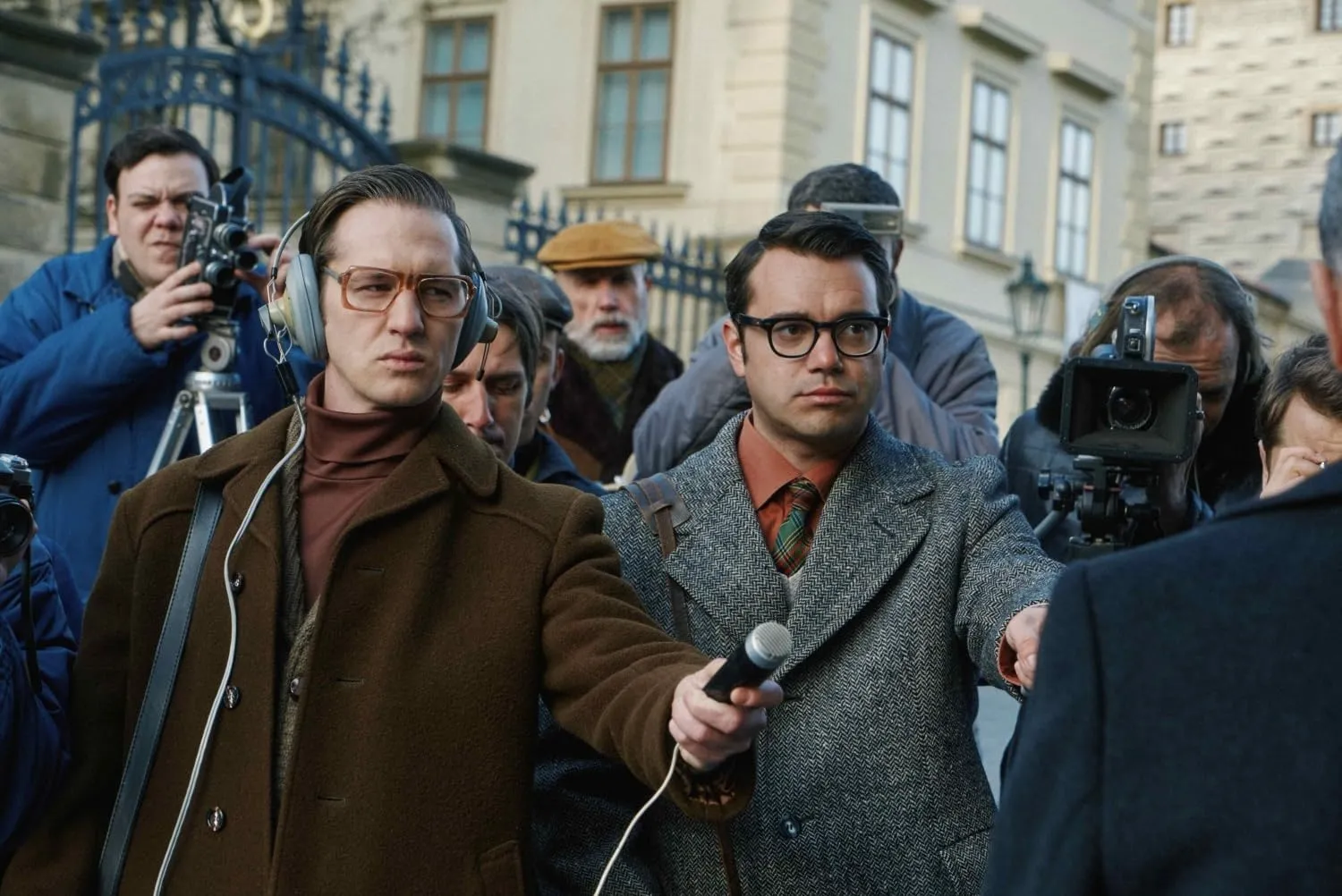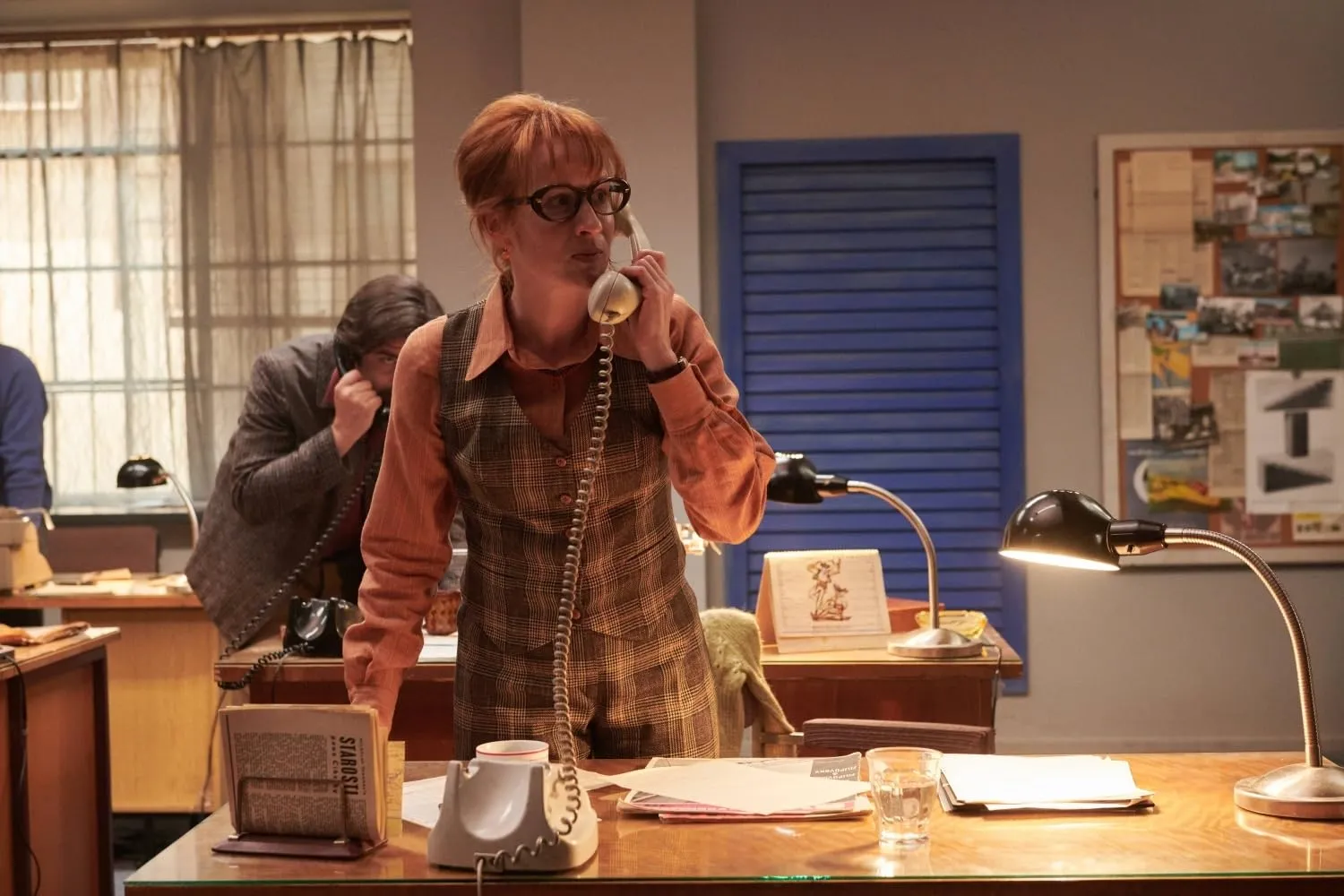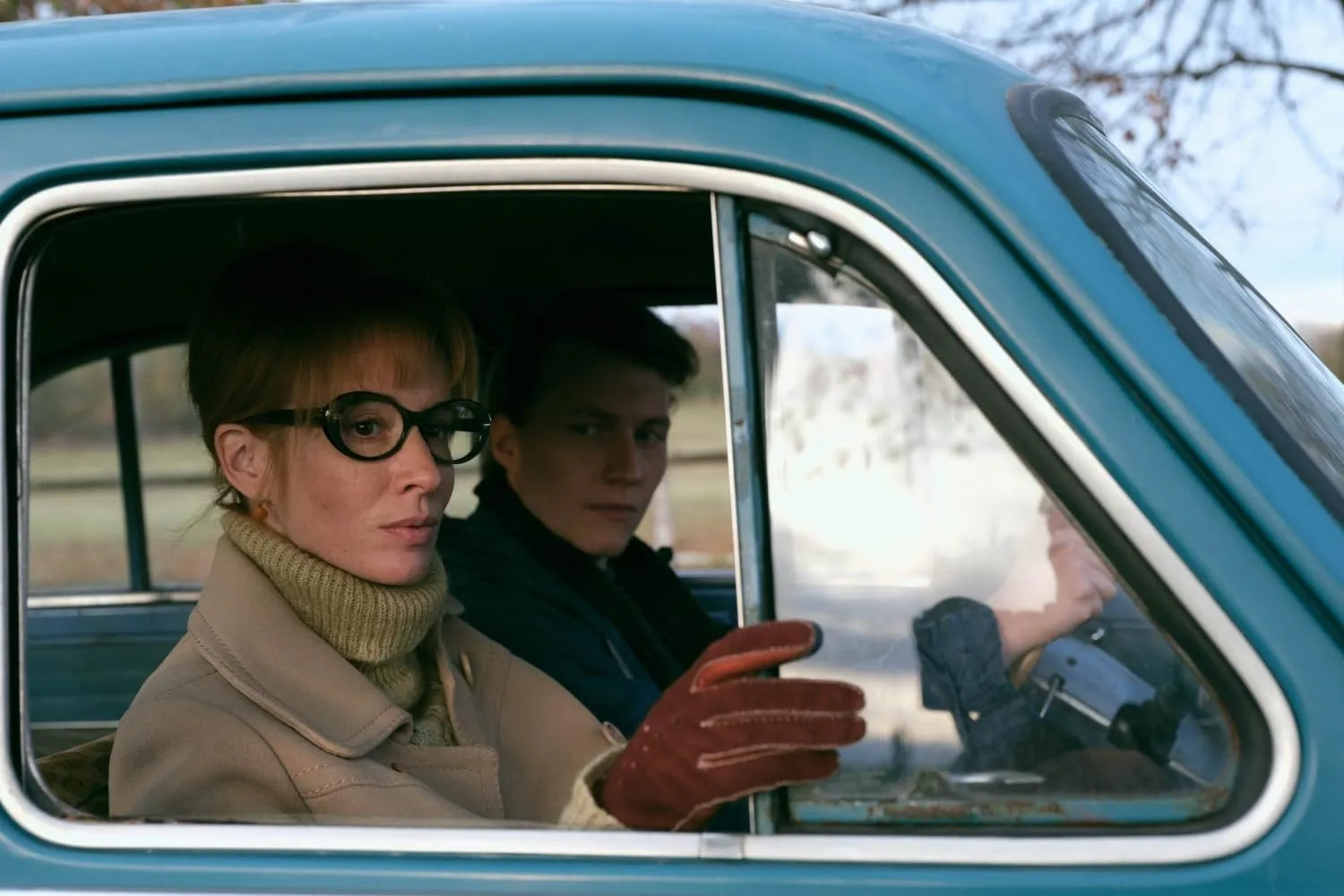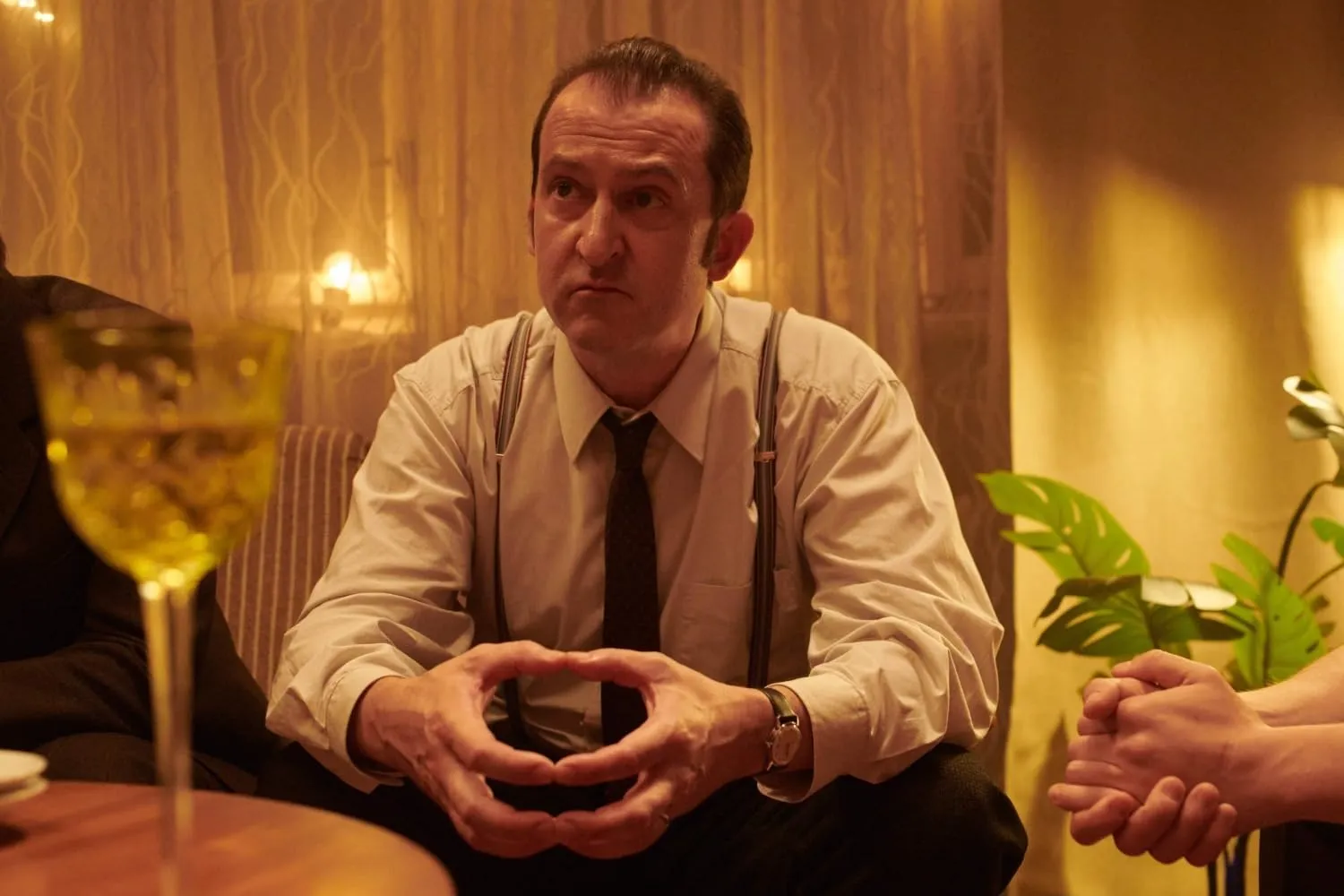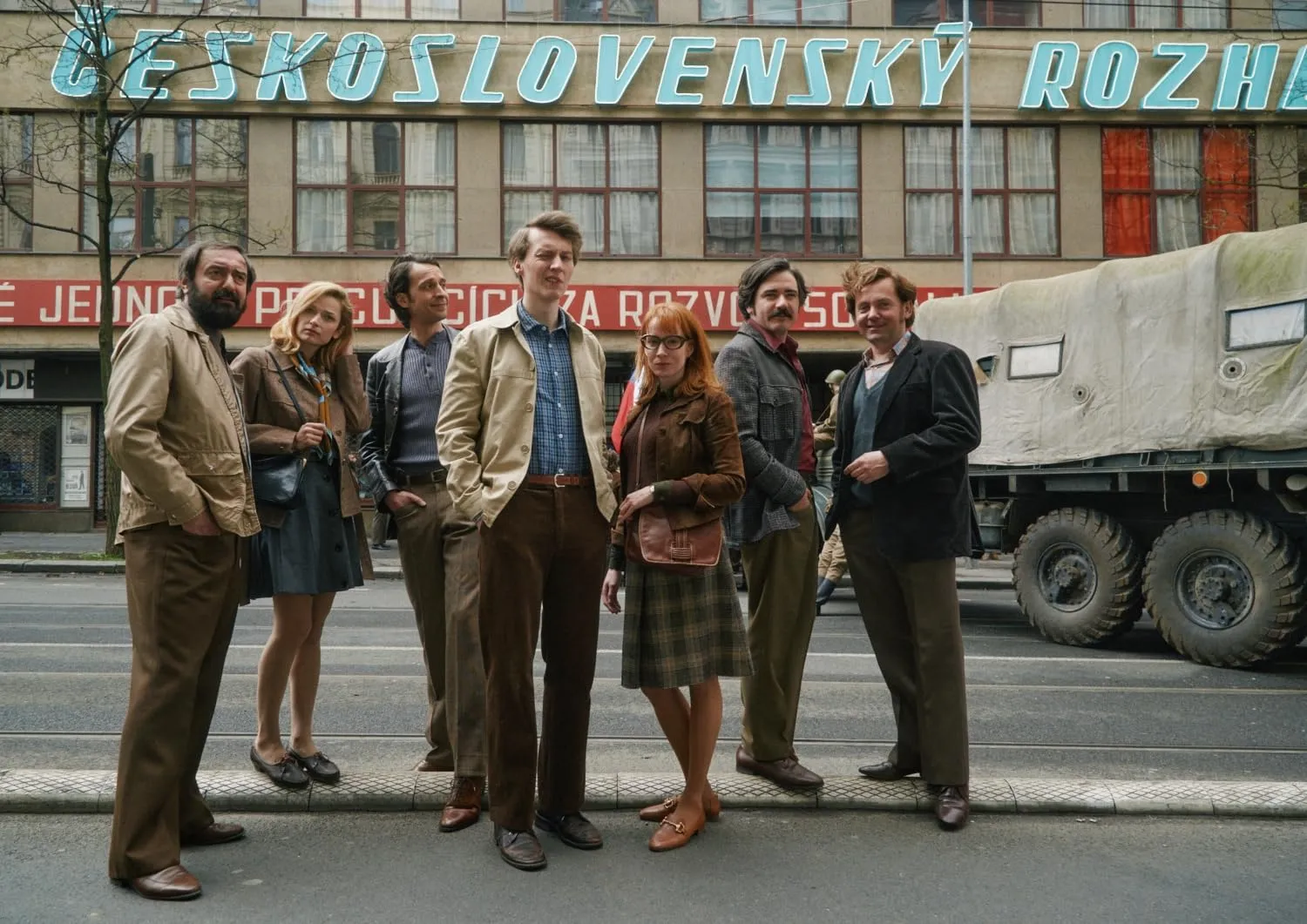Through Waves, Jiří Mádl weaves a fabric from history, memory, and the human spirit’s constant desire for freedom. This film goes beyond historical retelling to grapple with its characters’ existential problems, especially the two brothers Tomá and Pavel face. It is set against the haunting backdrop of the Prague Spring in 1968.
The air is thick with both hope and impending despair as they navigate a landscape fraught with the weight of repression. This dichotomy reflects the larger battle of a country torn apart by the fervor of youth rebellion and the suffocating embrace of authoritarianism—a reflection of humanity’s eternal quest for the truth in the face of lies.
The Prague Spring, a brief period when change swept through Czechoslovakia, is an affecting backdrop. A flicker of hope was ignited by the desire for “socialism with a human face,” but the cold approach of Soviet tanks quickly put it out. This powerful pairing of hope and destruction profoundly questions the quest for freedom and the price of truth.
When the ideals of a generation meet the harsh reality of state-sanctioned oppression, a philosophical question about the fragility of human agency lies beneath the surface. Mádl immerses us in this turbulent world and asks us to ponder: what does it mean to be human in a world where the lines between right and wrong are fuzzy? What sacrifices are we ready to make for the whispers of truth in the clamor of silence?
Fractured Reflections: The Havlik Brothers
A figure caught in the web of responsibility and resignation, Tomá Havlik, lies at the heart of Waves. As a quiet technician lost in a sea of turbulent change, he initially embodies the ideal of the apolitical everyday person. He spends his days fixing radios, toasting bread, and protecting his younger brother Pavel from the harsh scrutiny of a society that wants to destroy any semblance of family order.
This is his mundane world. But even in his stillness, there lies a deep tension, a silent scream against the shadows of power that are coming closer. Tomá’s journey is one of reluctant awakening as he faces the moral maze of his life, torn between the need to protect his brother and the growing need to join a cause bigger than himself.
Tomá grapples with morally ambiguous choices as the film progresses, dealing with the weight of betrayal that results from being forced into informant tasks. His conflict with himself reflects a deeper existential struggle: the inherent duality of human nature, where survival instinct and ethical duties clash violently. Mádl challenges us to ponder the essence of courage: does it reside in the quiet act of compliance or the radical act of defiance? Tomá is not portrayed as a hero in the film but as a flawed vessel navigating the rough seas of conscience. He represents the uncertainty that shadows every choice in a world of fear.
On the other hand, Pavel is the perfect example of a rebellious teenager who can’t get enough freedom. The fervor of political rising and the alluring promise of change has ignited his spirit, which is burning brightly. Pavel’s character serves as a mirror for Tomá, reflecting the unrealized potential of a generation longing to escape the grips of a suffocating government. Their relationship is fraught with conflict because they are loyal to each other as siblings and have different political views.
Pavel stands out as a source of hope, challenging the status quo and having the courage to dream of a life free from oppression as Tomá grapples with the burdens of adulthood. However, the shadows of their shared past loom large, telling us that the quest for freedom is often marked by loss and sacrifice. In their quest, Waves explores the complexities of family ties in the midst of a landscape of despair, inviting us to confront the haunting question: can love last when society itself falls apart?
Voices in the Dark: The Significance of Czechoslovak Radio
The whisper of truth fights against the roar of tyranny in the suffocating embrace of censorship, and Czechoslovak Radio appears as a flickering beacon of hope. The journalists working there are more than just reporters; they are the guardians of integrity, risking their own lives to preserve the purity of open communication.
Leading the way is Milan Weiner, a person with strong morals and unwavering resolve who embodies the spirit of resistance. The fight for truth becomes an act of defiance against a government that wants to silence dissent under his rule, which turns the airwaves into a battlefield. Each broadcast is more than just news; it’s a statement of being, a refusal to be hidden in the face of tyranny.
Mádl skillfully weaves together the personal and the political as the story progresses, illuminating the high stakes of journalism in this troubled era. In a world where propaganda frequently obscures reality, the film asks profound questions about the quest for truth. What does it mean to bear witness when the act of bearing witness threatens to tear the very fabric of one’s life apart? When journalists stick to doing fair reporting, they become living examples of a moral duty that goes beyond their job; they are the soul of a society desperately holding on to its humanity.
In light of this, the film shows the press as a fortress against the rise of tyranny as well as a source of news. Telling the truth becomes a revolutionary act, a flicker of resistance in the darkness surrounding us. This brings up another troubling question: Can the quest for truth continue in a landscape where the act of speaking out is fraught with danger? Waves make its audience grapple with the precarious balance between safety and integrity, leaving us to ponder whether the fight for free speech is worth the unavoidable costs.
The Struggle Within: Censorship and Resistance
In Waves, the conflict between personal duty and public duty plays out like a tragic symphony, with each note carrying the weight of a psychological crisis. Tomá and Pavel Havlik exemplify this tension, which pits family ties against the harsh landscape of state oppression.
Tomá struggles to balance his need to protect his younger brother with the growing realization that silence in the face of tyranny is a betrayal of their shared humanity. This internal conflict reflects the larger social conflict, illuminating the shadowy recesses of the human mind where fear and duty meet. Are we not forced to choose between the safety of those we love and the moral duty to fight injustice in these times?
The film expertly captures the subtleties of navigating such dangerous terrain, highlighting the unstable nature of loyalty—both to family and to ideals. We are left to ponder: What sacrifices are we willing to make for the sake of truth? The characters are stuck in a moral maze where every choice is fraught with the possibility of loss. Mádl’s exploration of these topics invites the audience to reflect on their lives, pondering how we might conform to oppressive norms for personal safety.
On the other hand, the youth movement stands out as a bright pulse of hope and a clarion call for change in the middle of the growing darkness. A generational awakening and a rejection of the status quo are represented by young activists who were moved by the fervor of the Prague Spring and took action. The contrast between the cautious pragmatism of older generations and the fervent willingness of youth to confront authority head-on is highlighted by their idealism and unwavering spirit.
This difference serves as a powerful reminder of how much history depends on the bravery of the young, challenging us to think about who will be brave enough to speak out in a world where voices are silenced. The film skillfully weaves these ideas together to show that the quest for freedom is both an internal struggle and a collective uprising, leaving us to grapple with the deep meanings of our choices in a world fraught with uncertainty.
Framing the Past: Cinematic Style and Direction in Waves
Jiří Mádl’s choices as a director in Waves are a superb mix of form and content. Each frame pulses with the weight of history and the urgency of the present. His style is both lyrical and visceral. It captures the fleeting beauty of moments while also bringing out the harsh truths of censorship and resistance. The use of old footage, seamlessly woven into the film’s narrative fabric, serves as a haunting memory of the past.
The audience is forced to confront the stark contrast between the hope of the Prague Spring and the impending darkness of Soviet occupation by these grainy images of protests and military incursions, which evoke a visceral connection to the events of 1968. This method not only grounds the fictional story in history but also blurs the lines between real life and cinematic representation, making viewers grapple with the complexities of memory and truth.
The way Mádl structures his stories, using a beat that changes between the personal and the grand, adds to this emotional impact. The pace is slow but fast, building tension through a number of well-thought-out vignettes that reflect the characters’ inner turmoil against the backdrop of societal upheaval. A palpable sense of uncertainty that matches the characters’ own struggles is created by juxtaposing scenes of calm domesticity with scenes of chaos.
The audience can engage with the characters’ emotional landscapes while staying acutely aware of the larger forces at play as the story progresses, thanks to the expert maintenance of the balance between personal narratives and larger historical events. In this way, Waves goes beyond mere historical drama, inviting us to ponder the existential weight of our choices in the face of oppressive systems and eventually asking: how do we navigate our lives amidst the weight of a turbulent past?
Depths of Despair: Emotional and Psychological Resonance in Waves
The connection between Tomá and Pavel Havlik, fraught with emotional weight and existential tension, lies at the heart of Waves. The death of their parents has tethered Tomá to a role that transcends mere guardianship, thrusting him into a landscape where responsibility becomes both a shield and a shackle.
The shadow of loss looms large over their interactions. His motivations are tinged with palpable anxiety as he navigates the perilous seas of state oppression. He wants to protect his younger brother but feels suffocated by the weight of family duty. This dynamic is a moving look at how love can both reveal and hide things, leading Tomá to make decisions that may eventually reveal the essence of his love for Pavel.
This film does a great job of putting these personal struggles into the bigger picture of a society that is about to fall apart. As the brothers confront their problems, they stand for individuals’ bigger moral problems when living under oppressive governments. How do personal choices reflect the larger fight for dignity and truth in a world where survival often requires complicity? Does Mádl’s story pose a question? The complexity of their relationship serves as a microcosm of societal conflict, inviting viewers to confront the dark sides of human experience amidst the chaos of history.
Echoes of the Past: Reflections on Waves
The profound themes of censorship, familial loyalty, and the never-ending search for truth are expertly woven into Waves’ tapestry of despair and fortitude. The film explores the terrifying tension between personal sacrifice and moral responsibility through the eyes of Tomá and Pavel Havlik, forcing viewers to confront the shadows of history that linger in the past.
Pavel’s fervent idealism represents the young people’s desire for freedom against authoritarian oppression. At the same time, Tomá’s moral conundrums reflect the quiet struggles of a generation stuck between conformity and revolt.
Mádl skillfully combines personal character arcs with larger historical narratives in this cinematic landscape, compelling us to reflect on the human condition in times of turmoil. Their intense emotional connection is a microcosm of the social problems that characterize the era, making us think about how our choices affect the larger picture of history.
Waves resonate with frightening relevance as we navigate today’s world, illuminating modern issues of freedom, censorship, and the integrity of the media. The film is a powerful reminder of the moral obligations that support survival in an era where competing narratives frequently obscure truth. How can we, as individuals and as a society, engage with the echoes of the past while working toward a genuine and just future?
The Review
Waves
Waves hauntingly explores the complexities of loyalty, truth, and morals in the face of oppression. Ji Mádl's masterful direction combines personal stories with historical facts, inviting viewers to reflect deeply on the human condition. The film makes a powerful point about the sacrifices that love and resistance demand. Tomáš and Pavel's friendship shows how deep their feelings go. Waves serve as a crucial warning of the ongoing fight for freedom and integrity in an era where the echoes of censorship can still be felt.
PROS
- The actors deliver emotionally charged portrayals that resonate deeply.
- Jiří Mádl’s vision effectively combines personal and historical narratives.
- The film explores themes of censorship, loyalty, and moral responsibility with nuance.
- Integrates historical context seamlessly, enhancing the storytelling.
- The character relationships are rich and complex, inviting audience empathy.
CONS
- Some viewers may find the pacing uneven, particularly in slower segments.
- The depth of philosophical themes may be challenging for casual viewers.
- The darker subject matter might not resonate with all audiences.







































